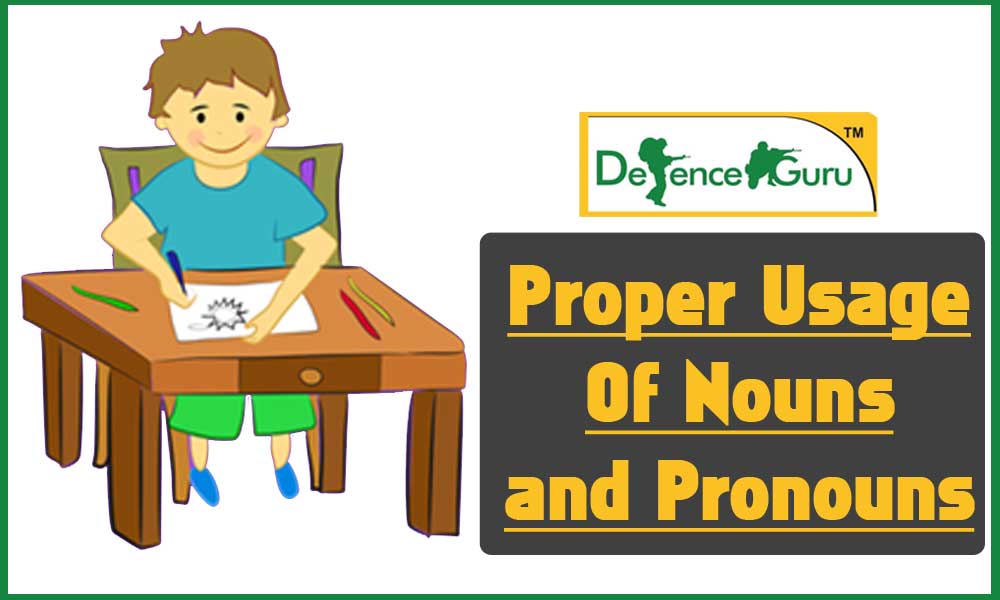Proper Usage Of Nouns and Pronouns
Here We Share Proper Usage Of Nouns and Pronouns in English Grammer. Subscribe Defenc guru Online Portal for Latest Update of Exam Notification and Study Notes.
Â
Rule 1.
A Pronoun should agree with its antecedent in person, number and gender.
For Example :
Every father must bring up his children properly.
All students should show their home work.
One must do one's duty.
Each girl should contribute her share.
Rule 2
Each, every, either, neither, many a, any, anybody, everybody, everyone, take a singular pronoun.
For Example :
Incorrect : Everybody in the bus were injured.
Correct : Everybody in the bus was injured.
Incorrect : Each boy paid their own share.
Correct : Each boy paid his own share.
Incorrect : Everyone are happy with their effort.
Correct : Everyone is happy with his effort.
Rule 3
Anyone, everyone, each, everybody etc. take a pronoun which agrees with the antecedent gender. However, when gender is not mentioned, then masculine pronoun is used.
For Example :
Incorrect : Every student must show their homework.
Correct : Every student must show his home work.
Incorrect : Anyone can ask for their turn.
Correct : Anyone can ask for his turn.
Note One and everyone take different pronouns. One is used throughout.
For Example :
Incorrect : One should do his duty.
Correct : One should do one's duty.
Incorrect : Everyone should do one's duty.
Correct : Everyone should do his duty.
Rule 4
When the verb form to be (is, am, are, was, were) is to be complemented by a pronoun, it should be in the nominative form, i.e. I, you, he, she.
For Example :
Incorrect : It was him who came in the morning.
Correct : It was he who came in the morning.
Incorrect : I am taller than her.
Correct : I am taller than she.
Incorrect : Is it me you are looking for?
Correct : Is it I you are looking for?
Incorrect : You are smarter than him.
Correct : You are smarter than he.
Rule 5
A pronoun in its objective from (him, her, me) should be used as an object of a verb or a preposition.
For Example :
Incorrect : He has helped I and my father.
Correct : He has helped me and my father.
Incorrect : She, who appeared so considerate, turned out to be cruel.
Correct : Her, who appeared so considerate, turned out to be cruel.
Incorrect : Between you and I, you are a crook.
Correct : Between you and me, you are a crook.
Incorrect : Except he all were present.
Correct : Except him all were present.
Rule 6
If three persons are used in a sentence, the order should be Second person, Third person and First person.
For Example :
Incorrect : I, you and he can leave at 5 p.m.
Correct : You, he and I can leave at 5 p.m.
Incorrect : If Ram and you are going, I and Sham shall accompany you.
Correct : If you and Ram are going, Sham and I shall accompany you.
Rule 7
Each other should be used for referring to two persons or things, one another for referring to more than two.
For Example :
Incorrect : Husband and wife exchanged vows with one another.
Correct : Husband and wife exchanged vows with each other.
Incorrect : People should love each other.
Correct : People should love one another.
Rule 8
Yours is usually used before words ending in -ly, otherwise your is used
For Example :
Incorrect : I am, your obediently.
Correct : I am, Yours obediently.
Incorrect : I remain, Yours affectionate husband.
Correct : I remain, your affectionate husband.
Rule 9
Who and Whom are often used incorrectly.
Who is to be used in Nominature (subjective) case.
Whom is to be used in objective case.
For Example :
Incorrect : There are some whom I think are very smart.
Correct : There are some who I think are very smart.
Incorrect : Whom do you think was there?
Correct : Who do you think was there?
Incorrect : Who do you wish to address?
Correct : Whom do you wish to address?
Incorrect : Who the gods love die young.
Correct : Whom the gods love die young.
Rule 10
A Reflexive pronoun (addition of self) is used as an object of a verb, and refers back to the same subject.
For Example :
The culprit hanged himself.
If we write "the culprit hanged him", 'him' would refer to somebody else and not to the culprit himself. The meaning thus would change.
When you wrong me, you actually wrong yourself.
Some people always talk about themselves.
I plan to go myself.
We ourselves are to be blamed.






